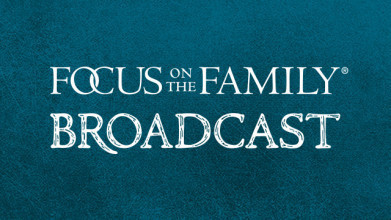John Fuller: Today on Focus on the Family, we’re gonna be talking about, uh, helping your children understand the birds and the bees, have the talk, and I’m letting you parents know this ahead of time so you can kind of usher the young ones out of listening range. Our guests are Jessie Minassian and Danny Huerta.
Danny Huerta: One of the members from our Plugged In team shared his story about having to talk with his son, and they had gone away for the weekend and he shared how the sperm and the egg come together. And immediately his son said, “Dad, I knew it. We came from eggs.” He was so excited (laughs) to find that out. He wanted to tell his friends that we did come from eggs, we’re chickens, (laughs).
Jim Daly: Well, John, last time we had a great conversation with our guests, uh, Danny and Jessie. And if you miss that episode, go to the website, get the download, or download the app for your smartphone. Uh, listen to it ’cause I think it really helps parents be better equipped to have that discussion over a longer period of time. Not just the talk, but many talks that help your young children better understand, uh, what God has done in this big design. Uh, we described some of the hurdles that families face during those teen years. Things like peer pressure, social media, and the boy girl relationship. Uh, we also explained how parents can get out ahead of these issues, discussing them beforehand with your pre-teen. That’s really important. Don’t assume that your kids are in a bubble. That bubble has probably been burst by the culture at some point. So engage them and start talking with them about God’s design for human sexuality. We also introduced, uh, all of you to a resource that will help you in this process. It’s a video-based curriculum from Focus on the Family called Launch Into the Teen Years. And it’s a tool that you can use to assist you in this effort.
John: It’s all designed to foster communication, to be upfront, to have a safe, uh, space for your kids to be able to really understand what, uh, sexuality and what puberty is all about. Uh, Launch Into the Teen Years includes a journal for your child, it includes a guideline for you to have some step-by-step conversations and some downloadable videos. And it’s all available at focusonthefamily.com/broadcast. Or we can tell you more when you call 800, the letter A and the word FAMILY.
Jim: Uh, John, you mentioned our guest, Danny Huerta and Jessie Minassian, they’re both back with us today. We’re glad to have them. Danny’s a licensed social worker who heads up our parenting and youth team, uh, here at Focus, and Jessie has been on the broadcast many times before. She’s an author, blogger, and host of an interactive website called Life Love and God, Danny and Jessie, welcome back.
Danny: Hey, thanks for having me on the show.
Jessie Minassian: Thank you.
Jim: It’s so good to have you back here for-
Danny: Thank you.
Jim: … the talk (laughs).
Danny: We need help (laughs).
Jessie: I was gonna say they should go back and listen to la- yesterday’s broadcast just for fun (laughs).
Jim: Yeah, that’s true. There you go. It always is-
Jessie: Some laughs.
Jim: … a little bit fun, but it’s uncomfortable for adults even.
Jessie: (laughs).
Jim: And, uh, you know, that’s part of it. It’s just, it is what it is. Uh, we need to acknowledge that going through puberty can be awkward.
Jessie: Mm-hmm.
Jim: I mean, that’s what’s so funny. Even as adults, it feels awkward to talk about the talk, right?
Jessie: (laughs).
Jim: And I know some people are gonna maybe write us or contact us and say, “You guys shouldn’t be talking about this.” That’s how bizarre it is. But let me put those fears to rest if I can, which is to say the culture has your children so many hours a day bombarding them with advertisements and other things through social media. Let’s, as Christians particularly, let’s spend a little bit of time thinking about and strategizing how we can help our children better navigate this area of their lives. And if you turn your your back to your kids, they’re gonna learn things that will not honor the Lord. And that’s on you as mom and dad, if I could be that bold. So let’s, you know, stretch ourselves a little bit. Let’s talk about this wonderful gift that God has created, and it’s our physical intimacy. And the idea that he wants us to keep that within our marriages. It’s his wedding present to us, I love that concept. And let’s be comfortable enough to talk about it so our kids can have a joyful attitude about it-
Jessie: Mm-hmm.
Jim: … not a fearful one.
Jessie: And to remember that it’s not that these topics are not just about our sexuality, but there’s so much more encompassed in these pre-teen years as they’re getting ready to launch into the teen years, that there’s friendship dynamics and the media component and their identity and being wise with how they spend their time. That’s all wrapped up into this concept of preparing well.
Jim: You know, let me jump in there because one thing, and I think, again, not to stereotype, I know we get the 80/20% rule, but dads can make light of this stuff-
Danny: Mm-hmm. Yeah.
Jim: … uh, you know, especially with their kids. I’m just thinking of those little lines we might say joking about the changing of a young man’s voice. You know? “Oh, you’re going through that. Hey squeaky.”
Danny: (laughs).
Jim: You know, we can say a lot of things that, you know-
Danny: Mm-hmm.
Jim: … can actually intimidate that child, you know, dad’s noticing what have you. What’s a better way to handle it, Danny?
Danny: Yeah. Well, that’s a hard one because it is funny.
Jim: (laughs).
Danny: It is funny (laughs) Yeah.
Jim: But do it in such a way that doesn’t put the child down or demean the child. That’s critical.
Danny: And the relationship needs affection, it needs encouragement. So if dads are balancing it with a relationship where they’re building in their sons and they’re noticing the good things about their sons, uh, and also showing them affection, then it’s balanced well with being able to laugh. But if that’s the only comment they make about their son, then it’s very damaging. It creates shame, it creates intimidation that, “I don’t measure up to what my dad wants me to become.” And so, as dads, we can be intentional about building in our sons a, an, an encouraging habit and encouraging pattern. And I think where a lot of parents, uh, struggle is that they view their role in sexuality as a defense rather than offense.
Jim: Hmm.
Danny: As Christian parents, we have the best offense. We’ve, it’s already been written in the book of life, right. That, that God has designed sex, he’s designed our bodies intentionally to fit together the way they do, and to also compliment one another in the physicality, in the emotionality, in the various aspects of how he created male and female. And we, we have all that information and we get to impart that to our kids along the way from a young age and, and, and finding opportunities to teach that, our role is to be on offense and not go off of fear and defense. We have nothing to fear, but we have a lot to give.
Jim: Yeah. Jessie, let me ask you, uh, the discussion with girls is a d- different discussion, obviously.
Jessie: Mm-hmm.
Jim: And there are three guys sitting here with you, so you’ve got to represent this. I don’t even know what that discussion’s like, because with young girls, there’s so much that’s gonna take place with their body.
Jessie: Mm-hmm. Mm-hmm.
Jim: I mean, again, they’re gonna develop, their breasts will develop.
Jessie: Yeah.
Jim: They’re gonna have their first period. It’s very different from the boys. Boys, basically they’re just gonna smell bad.
Jessie: (laughs).
Jim: So they’ve got, they’ve got to, you know, make sure hygiene is somewhere in their, in their daily, hopefully daily routine.
Jessie: Yeah. Yeah.
Danny: But boys do compare size though, Jim. Right?
Jim: Well, yes. Yeah. Muscles and I went through that in high school. Yeah. But the, but the point is, it’s more complicated-
Jessie: Sure. Sure.
Jim: … at least from where I sit, maybe-
Jessie: Yeah.
Jim: … you say no.
Jessie: No. Yeah, it is.
Jim: But what is a mom, particularly in that discussion with the daughter, how do you handle that, uh, gingerly and with the right attitude?
Jessie: Yeah. It’s difficult because they’re going through and starting their menstrual cycle. That’s a very traumatic thing for a young woman. And some of them puberty’s starting so early now for many girls that-
Jim: Well, sometimes catching them by surprise, cause they-
Jessie: Absolutely.
Jim: Mom hasn’t had that-
Jessie: Absolutely.
Jim: … opportunity, or hasn’t taken-
Jessie: Yeah. Yeah.
Jim: … the opportunity.
Jessie: Absolutely. So I can’t emphasize enough the importance of beginning these conversations early before they’re even beginning to develop, to talk about, your body will be changing at that time. And then as you start to see, um, you know, breast buds developing to start either, um, using laundry just in conversation to begin talking about what changes are gonna come, and to do it in as casual and conversational way as possible so that they know that they can come to you with questions. And it will be multiple conversations. I remember walking into, uh, a public restroom with my girls. They were fairly young, probably six, seven at the time, and there were some feminine products out. And so the girls were like, “What are those?” And so that opened up the opportunity to discuss in a, in an early stage and what will be coming with the menstrual cycle. And so I thought we were good. I checked that box off. I’m like, “Sweet. We got that done early and now we don’t need to-”
Jim: Yeah.
Jessie: “… worry about it for a while.” And sure enough, uh, you know, as their friends started having their periods, we had to talk about it again. And, and I thought that they’d already received this information-
Jim: Right.
Jessie: … but we had to (laughs)-
Jim: You check the box.
Jessie: … discuss it, discuss it again. And as they’ve gotten older, we’ve gotten into more detail. And then as they’ve begun their cycles, then having the conversations, um, all over again and help guiding them through it, it can be a really scary time. Um, someone close to me, they, they thought they were dying. They had not been told that this would be coming. And so they woke-
Jim: Right.
Jessie: … up in the morning and they thought their life was about to end (laughs).
Jim: Hmm. Right. I mean, yes.
Jessie: It can be very traumatic. And so walking them through it, um, is so important.
Jim: Yeah.
Danny: And dads, dads play a significant role with daughters, Jim, I think that’s important to, to throw in here.
Jessie: Mm-hmm. Mm-hmm.
Danny: Uh, I, I really do think that when, when these changes are happening, dads can begin to teach how they need to be treated-
Jessie: Yes.
Danny: … by a, a-
Jim: Absolutely.
Danny: … a boy around them, because we do have guys that are consumers, right?
Jessie: Yes.
Danny: And you need to be able to find the guys that are contributors and genuinely care about who you are. They need to be also begin to learn that their clothing communicates something externally as their bodies are changing. That awareness is important for us as dads to step into and, and have-
Jessie: Mm-hmm.
Danny: … conversations with our daughters about.
Jessie: Mm-hmm.
John: Yeah. I tried to normalize a lot of that, uh, kind of interaction with my girls, and I think it helped, I think (laughs).
Jessie: I’m sure it did. It, it, that plays a huge role. I recently was in a, um, taxicab with, the driver was telling me that when his daughters started their period, they actually called him to tell him, they had this kind of relationship with their daddy. And he went to the store and bought them a red velvet cake. I am not making this up (laughs) and balloons, and brought it home. And they threw a big party. And I thought, how sweet to have that kind of relationship with your daddy to where he would celebrate this coming of age with you.
Jim: Well, and, and that points to the passage from childhood to, you know-
Jessie: Mm-hmm.
Jim: … young adulthood, certainly.
Jessie: Mm-hmm.
Jim: You, speak to that issue of how do we do that? I think for girls that might be a little easier because physically they’re changing and they’re changing in demonstrable ways that they know, and mom and dad know.
Jessie: Yeah.
Jim: Boys, it’s a little more subtle to have that recognition of the passage. In our culture, we really don’t do a lot, particularly with boys, to say, “You’re no longer a boy, you’re now a young man, and you need to go this way and think this way.” So how do we more formally do that, Danny?
Danny: Yeah. The way we did in our home is at the age of 13, we had a big party, a celebration for my son. And I encourage families to do this in my counseling practice. And that is to look at what, what men have spoken into your life as a dad, and invite them to this party and have them write a letter of blessing and encouragement to your son. My son still has that. And I’ll ask him, “Hey, do you, have you looked at that lately?” And that, that book is there for him to be reminded about these men praying for him, and they committed to praying for him in his teen years. We need to remind them that life is about celebrations and new steps and leveling up and more expectation, more responsibility. And at that 13, we talked about the responsibilities and ownership, that little decisions begin to make the big decisions of our lives.
Jessie: Mm-hmm.
Jim: Yeah.
Danny: And that’s, at 13, you begin to own that more and more. And that’s a handing off to him and a blessing as a dad in front of men that have spoken into my life. And, uh, even if you have one man that has spoken to your life, invite him, have a dinner. And, uh, it doesn’t have to be elaborate, it can be simple, but it’s a stopping point where you’re, uh, pressing a reset button for your son and helping him see that you wanna intentionally building him and committing as a dad to do that with him.
Jim: Uh, Jessie, what’s a, the female equivalent of that? ‘Cause we do, that’s, um, raising a modern day night. That topic we’ve covered-
Jessie: Mm-hmm.
Jim: … how a, how to help a young man, a boy become a man. I’ve not heard a lot in the, the girl space when it comes to that.
Jessie: That’s a great point. I think we can naturally tend to focus on, you know, starting your period as kind of that turning point for a young woman.
Jim: Right.
Jessie: And that can be a great celebration. Or even just getting together to talk about their changing body and everything. Having a weekend away or, um, going through curriculum like Launch and having some kind of reward at the end. Getting to go out together or going somewhere-
Jim: Yeah.
Jessie: … together, um, just to celebrate that. But I love what Danny said about other adults speaking into their life. And I’ve had several friends who have done this for their teen daughters, or 13, 16, 18, at those milestones to have women pouring into them, writing them letters of encouragement of challenge for them-
Jim: Yeah.
Jessie: … and what to experience in their life.
Jim: Danny, uh, I know in the Latino culture-
Danny: Hmm.
Jim: … especially for girls, they hit their 13th birthday, I think it is.
Danny: Quinceanera. Right, right.
Jim: Right. That’s a big deal.
Danny: Very expensive (laughs). Yeah.
Jim: I mean, well, tell us more about it ’cause a lot of people won’t be familiar with it. But I think it’s a wonderful way that they celebrate womanhood.
Danny: Mm-hmm. It’s, it’s almost as elaborate as a wedding, uh, to be honest.
Jessie: Mm-hmm.
Danny: They spend a lot of money on these, and it’s a, it’s a rite of passage for a woman that she’s becoming a woman. And-
Jim: At what age? 13, 14?
Danny: At 15.
Jim: 15?
Danny: 15. Yeah. Uh, at 15 years old, the, the, the girl is, is waiting for this opportunity to be introduced into womanhood. Um, with daughters here in America, we do need to step in even as mom and dad, and commit to speaking at our daughter’s lives, that they, uh, that their worth, their identity. Uh, there’s so many, uh, messages coming through many different directions towards girls as to who they’re supposed to be. And, uh, man, just to help them understand, uh, their importance in our culture, but their strength that they bring to relationship is important in that, that rite of passage for them to own those little decisions they make and how they, uh, not only treat themselves, but also treat those around them. Messages are pretty damaging, the, the ones that are coming towards girls about who they’re supposed to be.
John: Our guest today on Focus on the Family with Jim Daly are Dr. Danny Huerta and Jessie Minassian, as we talk about parents preparing their, uh, young children and preteens for the transition into puberty. We hope you’ll check out a great resource that we’ve developed for your family. It’s a video-based curriculum kit called Launch Into the Teen Years, and it’s designed to help you and your child, uh, talk through issues like peer pressure and worldview and relationships and what it means to walk with Jesus. You can learn more about this fantastic resource at focusonthefamily.com/broadcast, or call us our number’s 800, the letter A and the word FAMILY. 800-232-6459. Let’s go ahead and hear the conclusion of our time together in the studio with Danny and Jessie on Focus on the Family.
Jim: Let me stick with the theme of the daughter because, um, that body image, how I look, is so critically important.
Jessie: Mm-hmm. Mm-hmm.
Jim: Um, and Jessie, uh, I think you have such great experience in this area. What kind of pushback do you hear from the girls that you’re communicating with at your conferences, et cetera? Um, and how, how do you advise parents to navigate those issues?
Jessie: Oh, this is a big topic (laughs).
Jim: Yeah.
Jessie: So, I’ll just scratch the surface here. But part of, one of the core questions that girls are trying to answer, and if they don’t answer in the teen years, they’re gonna be answering it in their adult years through making poor choices. But they need to know, am I beautiful? Am I lovable? And is there a God who would accept me despite everything I’ve done? So that, that question, am I beautiful? Is such a-
Jim: Hmm.
Jessie: … core identity question for us as women. So for parents in this age, as they’re heading into those teen years, it’s so important to be laying that groundwork, both with our words and our attitudes. Dad’s, the way that you talk about other women, the way that you look at other women, your daughters are picking up all of that. And in this culture that is so sexualized, I can’t emphasize enough how important it’s for parents to talk about their beauty in a God-honoring way. Not just focusing on the physical beauty or saying, “You look so grown up now with those new curves.” Right? Like, we wanna focus on the inside, but also express how beautiful they are on the outside.
Jim: That’s good.
Danny: Yeah. And God’s wanting freedom for us. That’s what he’s wanting, that he hasn’t set these rules for us to follow, but he’s wanting us to be free and wants us to establish trust in relationship, that was lost in the garden.
Jessie: Yeah.
Danny: Right. Trust is what we lost. And, and God, and that’s where sin was introduced in. Uh, and what we can establish our relationship in a marriage relationship is on a foundation of trust. And that creates freedom to be able to love wholeheartedly one another. One word that I’m obsessed with is steadfast, and I think that’s what you’re talking about. Creating a, a woman that is steadfast. No matter what messages you get, you still are able to gain that identity in Christ and be steadfast in times that are low-
Jim: Well, that’s true for-
Danny: … and in good times.
Jim: … boys too.
Danny: Right.
Jim: I mean, seriously, it’s all human beings. Uh, Danny you, uh, introduce a concept called, you call it the Godly Reset, uh, particularly with boys in that regard. What, what were you driving at? Impure thoughts, if I recall.
Danny: Boys relate to this because in video games especially, I, I, I did this in high school. I would, I would press reset when I was losing (laughs)-
Jim: Yeah.
Danny: … it’s this idea that if your mind is really going the wrong direction, you gotta figure out your reset button, press reset, and then do it differently. Whenever I did those games, I would press reset and then try a new strategy, a different strategy. I wouldn’t use the same decision making in that game. And so the same thing is with my mind. If I notice my mind going somewhere, it doesn’t mean that I’m a bad person. It means I need to press reset and, and, and grab onto my thoughts. Because with boys, uh, I’ve talked to my son over and over again about this is when, when you’re tired, when you’re bored, when you’re feeling lonely, those places leave you vulnerable to looking for that quick fix, which-
Jessie: Mm-hmm.
Danny: … is a sexual fix. That’s, that’s the quick and most powerful impact to your brain to feel better in the moment. But then you feel shame afterwards. And that a, a boy can get stuck in that cycle quickly with pornography, uh, sex outside of marriage, and they reset themselves that way rather than a mental reset and a God reset that David knew very well in Psalm 51. He said, “God, you, you can make me pure. You can make me whole again and looking for that wholeness in God.” And some guys will actually have a little reset button that they carry either in their wallet somewhere else to have as a visual to say, “It’s my job to press the reset button, and God will meet me there.”
Jim: Uh, Danny, in past generations, uh, parents have really relied… and Jessie, I’ll aim this to both of you, we’ve really relied on the dos and don’ts.
Jessie: Mm-hmm.
Jim: You know, we’re pretty solid with that. “Do this, don’t do that. And how come you did that? I told you not to do that. That was one of the do not do things,” right?
Danny: (laughs).
Jim: Am I confusing everybody? I’m well versed in the dos and the do nots as you could tell.
Danny: (laughs).
Jim: But, uh, you have a kind of a different way, Danny, to approach teaching kids about this. I think it involves bread, if I remember correctly (laughs).
Danny: Yeah. The, the bread exercise is a fun one to do, and, uh, that won’t always turn out perfectly. So, so be patient with it (laughs).
Jim: That’s good. I’m glad to hear that already.
Danny: That’s right. Uh, what you wanted to look for is a recipe, uh, on how to make bread. And usually they have it that you can make two loaves with it, and it, it has to call for yeast because it’s that important ingredient in this. And that you’ll, you’ll get your kids gathered around, say, “Hey, who do you guys want to give a gift to?” Usually it’s grandma or, uh, girlfriend’s mom or someone like that. And so you decide, “Okay, we’re gonna give one of these as a gift.” And you, you mix all the ingredients, and one of them you put straight into the oven right away, not like the recipe calls for, usually it’s 2, 3, 4 hours, uh, that you let the bread sit out and then stick it in the oven. So the other one you do as the recipe calls for you, stick that one in the oven. And at the end of that, you say, “Okay, which one do you wanna give as a gift to the other person?” And usually it’s the one that looks like the picture, which means you followed the recipe. And that leads to great discussion about ingredients that needed to take shape in the bread. All the ingredients were the same, but there needed to be patience. And in adolescence we get to learn about love about the different forms of intimacy, and it takes patience to get to the gift, which is the physical intimacy. And so talking through that, that you get to show up on your wedding night with a gift, you have all these ingredients, but it takes patience to get there. And, uh, some kids have, have, have really enjoyed that. And I remember one, one kid in particular in, in my counseling practice that said, “Hey, Mr. Huerta, I’m gonna show up to my wedding night with a loaf of bread, and I’m gonna, I’m gonna tell my wife the story behind this that I waited for her and I, I’ve, I’ve shaped these ingredients and learning how to love her for this night and, uh, and, and from there forward in this covenant.”
Jim: Uh, both Danny and Jessie, I mean, we have talked these last couple of days and encourage parents not to bury their head like an ostrich, embrace this-
Jessie: Mm-hmm.
Jim: … this is part of the parenting journey. Have fun with it. Be mindful of the conversation and what you’re trying to communicate to your kids, and do it in a thoughtful way, hopefully in a biblical way that honors the Lord. And hey, he’s watching too, right? (laughs), “How is he gonna do this? My son,” (laughs). But, uh, you know, have some fun with it. But in the end, so if I order Launch Into the Teen Years, what am I gonna do? How am I gonna start?
Danny: The way you start, Jim, is, is first setting up the, the idea that this is a special moment. You can plan maybe a weekend out with your, with your child. You can plan on some breakfast times to, uh, to just go through the video series and also prepare yourself as a parent for the conversations that you’re gonna have.
Jim: So I can do this over time.
Danny: You can do it from nine years old to 12 and end with a, with a great ceremony. Or you can do it all in one weekend or four weekends spread apart.
Jim: That’s pretty flexible.
Danny: It’s super flexible. And that was intentional because what we got feedback about from parents is that they wanna have the flexibility to do it however it works best for their child. And that’s what we wanted to create.
Jim: So it’s, it’s got that built into it.
Danny: It does.
Jim: Do it all at once, or you could do it over time. That’s terrific.
Danny: Yeah.
Jim: What are, give me some of the themes again that we’re gonna cover in the curriculum. What is a parent gonna do first?
Danny: Yeah, you, first you go into identity, that’s a very core piece. And then you go into friendships and then social media and emotions that can be stirred up even through, uh, bullying in their lives. And then you go into the changes in the body, the differences between male and female. And then you go to the talk, and this is to help you already have conversations, that flow of conversation before you get to the talk. You’ve already talked about some-
Jessie: The awkward stuff.
Danny: … deep things. Yeah. The awkward things (laughs), right? And, and this is something that you could start at nine and then continue each year and, and do again, uh, at, at 12. And you can do it with multiple kids at the same time. And that’s the flexibility and the great thing about this resource. I would encourage parents to really start at eight, nine because uh, we need to get in there right away.
Jim: Yeah. And Jessie, this is something I really love about and appreciate about you. Uh, you know, you’re an author, you speak to teen girls all the time, and yet when it was your moment as the parent-
Jessie: (laughs).
Jim: … it was like overwhelming for you.
Jessie: (laughs). It was nerve-wracking.
Jim: Describe that nerve-wracking to the parent who isn’t an author, isn’t a speaker. You know, we’re they’re doing their thing-
Jessie: Yeah.
Jim: … whatever it might be.
Jessie: Yeah.
Jim: But you were really well equipped and you still felt insufficient.
Jessie: I still got those butterflies in my stomach, like, “Oh boy. All right, here we go. I’m jumping in (laughs).” Yeah. But what I, what I want parents to know, just like me, I mean, these are your kids and I just looked at my kids and I, these are my kids. So our relationship is between them and I. No one else is, has the authority to speak into their lives in the way that I do. And no one else has the authority to speak into your kids’ lives the way that you do on this subject. Um, because you’ve been raising them from those little things you get to speak into their lives on this. It’s okay if it feels a little bit awkward. It’s okay if you need a resource to come alongside you and help guide you through those topic, talking points.
Jim: Yeah. If you don’t have the answers.
Jessie: Yeah, that’s why we did this, so that you’ve got, you know, you don’t have to do what I did and do it all from scratch. You’ve got something that can kind of take you through those milestones and make sure you’ve covered all the bases. Not just that you know, the one aspect of physical intimacy, but to make sure that you’re having a holistic and wholehearted approach to this conversation.
Jim: Well, again, I so appreciate it, the hard work that you both put into this, along with others, there’s other people that’s speaking into-
Danny: A lot of them. Hmm.
Jim: … this curriculum. So everybody’s done a great job and this is a resource for you and for your family. So if this is a time that you need to be thinking about it, again, maybe as the parent of a eight, nine year old or maybe as a grandparent of adult children that have 8, 9, 10 year olds, this is it. We have built this for you. Take advantage of it. Um, this is something that we haven’t had for quite a while and a lot of those, uh, sex talk curriculums are older. This is fresh. This is really the good stuff. And I hope you’ll contact us to get your copy of Launch Into the Teen Years.
John: Our number is 800, the letter A and the word FAMILY, 800-232-6459. Online, you can learn more about Launch Into the Teen Years and how you can get your copy at focusonthefamily.com/broadcast.
Jim: And lemme say, John, uh, I would like to suggest for $60, people, if you can support Focus on the Family with that $60 gift, we will send this Launch Into the Teen Years curriculum as our way of saying thank you. If you can’t afford it, get a hold of us. There will be others I believe in faith that will cover the expense of that. This is so important for our young people to have the right attitude toward God’s design for sexuality. Let’s not bury our head in the sand as Christian parents. Let’s boldly proclaim it. Let’s not be embarrassed about it. Uh, let’s love the journey and let our kids be able to see that in us so that they have something to hope for and to look forward to in their marital relationship in the future. Thanks to both of you for being with us.
Danny: Thank you.
Jessie: It’s been fun.
John: And again, if you as a listener need anything from us as a ministry, our phone number is 800, the letter A and the word FAMILY, 800-232-6459, or donate and get your copy of the Launch Into the Teen Years Kit at focusonthefamily.com/broadcast. Plan to be with us tomorrow as we hear from Dr. Greg Smalley and his wife Erin, as they talk about challenges that husbands and wives face in terms of spiritual growth.
Preview:
Erin Smalley: Because I had great expectations around what this was gonna look like. You know, I was marrying Gary Smalley’s son and he was gonna lead these phenomenal devos for me and guide me spiritually. What I didn’t account for is I’m a pretty strong-willed wife.
End of Preview
























